[This post was sent to Jadaliyya by Woman from Yemen.]
Walking through the old city in Sana`a there is no doubt that art is alive and is a part of our culture. Architectural beauty is not only appreciated but expected as well. The Revolution has revealed many hidden talents. "We have talent, but the Revolution gave us the opportunity to express them" said Khallad al-Faqih, member of al-Fajr Youth Coalition. Artists have used these talents to promote principles of the Revolution and provide inspiration and entertainment for protesters.
Many artists viewed Yemen as a "grave for talent" because society does not necessarily encourage artistic expression and some even look down upon it. There are very few art school, and in the university of the capital Sana`a, there is no art department. Artists hope that after the Revolution, there will be a stronger appreciation for the arts in Yemen. As their role at the squares increases, so does the threat against them by security. Artists have sometimes been prevented by security from bringing in their equipment to the square and sometimes their belongings have been confiscated.
This is a short intro to revolutionary art found at the square. This list of talented individuals gives hope that art is not dead and may flourish in the new Yemen.
Music: Traditional `oud artist Ahmed al-Qubaty, rapper Ghamdan Ali and guitarist Ahmed Asery are using very different musical styles to express revolutionary desires. They sing about social inequality, injustice, and hope for the future. Last night, artist Wissam Ahmed al-Qubaty, was chewing qat and entertaining his colleagues at the tent with the beautiful sound of `oud. Friends around him admired the sounds, and one remarked “I wish I could play Oud too.”
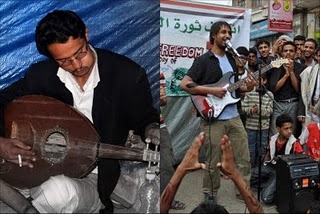
[Left: `Oud artist Wissam al-Qubaty. Right: Guitarist Ahmed Asery (Photo by Arwa Othman).]
Theater: Al-Watan for All Movement [حركة الوطن للجميع] coalition organized a play at the square entitled “Enough Injustice” in collaboration with actors and singers from the group Youth for the Future [شباب من أجل المستقبل]. This group is dedicated to using artistic expression for awareness raising. The play was well received as they could easily relate to it. Theater and visual art may be the best form of awareness raising in a society with very high illiteracy rates.
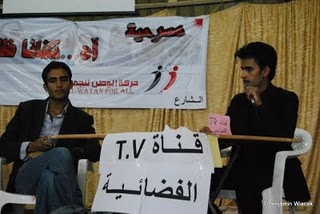
Poetry: We Yemenis love poetry. It is in everything we do including this Revolution. Poetry`s role had began to decrease, but with the Revolution there is a sense of revival. I began to pay attention to this after a French journalist, Ségolène Samouiller, asked me about the role of poetry in the Revolution.
On stage on a daily basis, at least one person has a poetry reading or recital. Sometimes it is their own poem, sometimes not. Poetry found at the square includes classical Arabic and popular poems. Audiences always interacts well with poetry.
One group at the square called the Coalition of Talented Yemenis (for literature, art, and culture) [rabitat al-mubdi`in al-yamaniyyin (lil-thaqafah wa-al-funun wa-al-adab)] uses art to advocate for rights, principles of the revolution, and artistic expression. They work on promoting poetry by conducting many activities, including training young poets on perfecting language and the power of recital. They have also collected revolutionary poetry in a comprehensive book that they hope to publish soon, once they have gathered enough funding.
In addition, many of the newspapers published at the square dedicate a section for poetry giving a chance for anyone to participate and submit their poems.
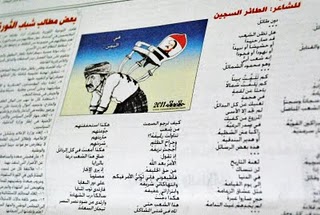
Painting: Painters are also taking their place at the square. Youth for Freedom and Justice Movement [حركة شباب من أجل الحرية والعدالة] has a studio-tent as a space for artists and art lovers to participate in expressing their emotions through painting. Art teachers are sometimes present to offer feedback and help young artists. Through their paintings they hope that people will express their inner feelings, and also use this space as a forum for awareness raising. "Art plays an important role in awareness . . . The number of people that come to our studio is a positive indicator of the civic state we hope for in the future," said Hazbar al-Maqtary, member of the group. So far, there have been at least three visual art exhibits at the square.
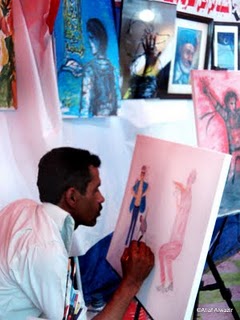
The power of visual art is the reason political cartoonists are publishing their cartoons in the various square newspapers and online. Assim Al-Madwaly is a young poet and cartoonist who believes that images have the power to change minds. Kamal Sharaf, another political cartoonist, was previously imprisoned for his cartoons but today continues to draw.
The paint brush was an important factor in encouraging one youth group to conduct a workshop for children of martyrs. A day for them to draw and express their emotions as a form of art therapy.
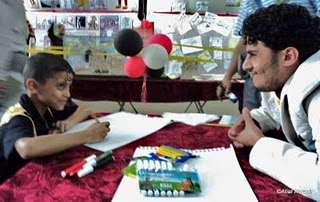
[Children of martyrs draw their stories.]
Photography & Film: Yemeni Photographers such as Arwa Othman and Abdulrahman Jaber; and film makers such as Sara Ishaq have had the courage to be at the forefront to document the revolution and inspire others with their artistic expression. Their photographs and short clips have allowed the world to see what is happening in Yemen through Yemeni eyes.
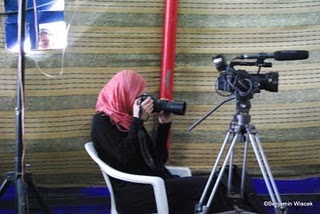
[Filmmaker Sara Ishaq in action. Photo by Benjamin Wiacek.]